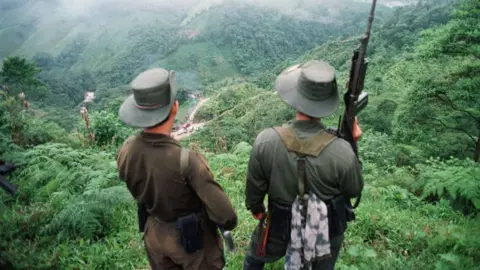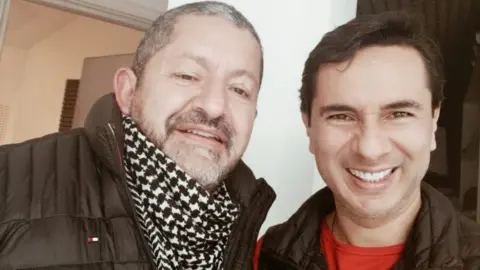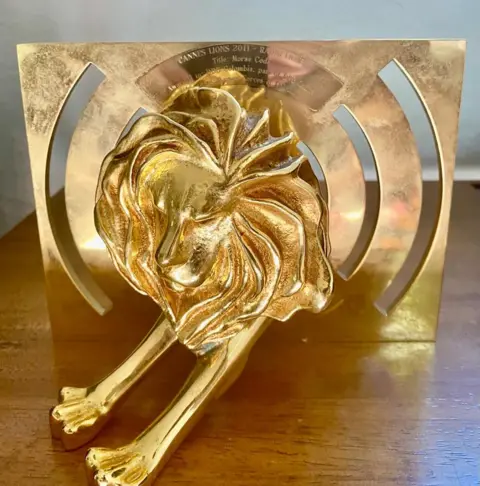How a secret message in a Colombian song gave hostages hope
 Sebastian Montañez
Sebastian Montañez With its catchy chorus and powerful lyrics, the pop song Better Days hit the airwaves in Colombia in the summer of 2010. But the song contained a hidden message that its creators could only reveal once the top-secret files about its true meaning were declassified.
"Malaria was an issue. Ticks were everywhere. When you sat down or tried to sleep ants would be crawling on you," says retired Maj Gen Luis Herlindo Mendieta Ovalle, who was held captive by the Revolutionary Armed Forces of Colombia (Farc) from 1998-2010.
"Then there was the fungus," he says, "because of the humidity, fungus would grow on your intimate parts, and we had no medications to treat it."
During Colombia's 50-year bitter armed conflict, atrocities were committed on both sides. In the early 2000s kidnapping had become a key strategy for the Farc to fund itself. Colombia's transitional justice tribunal estimates that 21,396 people were kidnapped during the conflict.
 Getty Images
Getty ImagesArmy soldiers and police officers were often the main targets. Chained in secret camps in the Colombian jungle, the conditions endured by the hostages were enough to make any person lose hope.
Rescue missions were dangerous due to the mountainous terrain and, like Gen Mendieta, some security forces hostages had spent several years in captivity.
At the time, Col José Espejo, then a Colombian army communications officer, knew how important morale among troops was to the success of a rescue operation.
"We desperately wanted to give the military hostages something that they could hold on to, a message of hope that would maintain their spirit and strength, so they could consider the possibility of escape if the opportunity presented itself," he says.
In order to deliver this message he decided to throw out the rule book and instead turned to Juan Carlos Ortíz, the CEO of an advertising agency. Mr Ortíz's government-funded anti-drug campaign had won an award for innovation, but had also attracted the attention of the Farc, for whom the cocaine trade was a lucrative source of income.
Mr Ortíz received death threats from the guerrillas and had to flee to the US with his family to begin a new life there. But he and his team decided to take up the challenge to come up with a way of getting a message of hope to the hostages.
A meeting with army representatives sparked an idea.
"They told us that Colombian soldiers in their basic training are trained [in] Morse code," he says. "We thought, 'Right, how can we communicate with them via Morse code?' It was a true light bulb moment."
 Alfonso Díaz
Alfonso DíazWith hostages kept deep in the jungle and communication from the outside world near impossible, creative director, Alfonso Díaz, says they realised they would only be able to get through to them via radio.
"During this era, a journalist called Herbin Hoyos - who did a lot for all of the hostages - created a programme called 'Voices of the Kidnapped'," he says, "to help reduce their feelings of isolation by broadcasting messages from their loved ones to those in captivity."
Mr Hoyos, who had also been a former hostage of the Farc, died of coronavirus in 2021. His programme was a lifeline for many during the years it aired and seemed like the perfect place to first broadcast the message.
Mr Díaz says they thought about including the Morse code in a joke, with the beeps apparently covering up swear words, but this didn't seem appropriate. Then he had the idea for a song.
Audio producer Carlos Portela says they initially thought of using "a cheerful vallenato or a salsa", but realised this might cause "the listener's mind to wander". So they decided instead on a sentimental song with emotional lyrics to help the hostages make the link between the song and the Morse code hidden within it.
"The lyrics to Better Days speak of the heart, of the resilience and the strength that the hostages must possess to be able to move forward and not to despair when they are alone," says Mr Díaz, who co-wrote the lyrics with Mr Portela.
They enlisted the help of rock singer Angelo, who had come up through the ranks of Colombia's version of the X Factor, and singer and actor Natalia Gutiérrez.
Mr Portela, along with composer, producer and sound engineer Amaury Hernández, carried out a lot of research into Morse Code, including how many words per minute a person could decipher. They decided to use a synthesizer in the track to help camouflage the message.
The code was inserted in three different places within the song and the team decided to transmit one simple message: "19 people rescued. You're next. Don't lose hope."
After eight months, the song was ready for its first broadcast in 2010 on Mr Hoyos's programme and by-passed the commercial stations to play on more than 130 rural stations across Colombia.
"There are many millions of people who have listened to the song Better Days, but that wasn't our goal," says Mr Ortíz. "Success for us was to be found in small, specific numbers. It was in the chosen few hearing it and understanding it."
Gen Mendieta, who had been rescued in the same year, helped the mission by appearing on live TV and asking the rebels to give the hostages access to the radio for company.
"Someone once said, 'Whoever has a book is not alone," he says, "and in our case, it was, 'Whoever has a radio is not alone.'"

Find out more
- Listen to The Documentary: Colombia's Life-Saving Pop Song on BBC Sounds (Producer: Anna Miles)

But with airplay also came the risk that the Farc would decode the hidden message.
"When you consider that the hostages were faced with the possibility of dying in the jungle, far from their families, to take a risk in the area of communications was both valid and important," says Col Espejo.
It was not until hostages started to be released over the next few months and years that intelligence about the success of the song came back. Col Espejo says one rescued hostage spoke of hearing the Morse code message in his psychological evaluation and had passed on its meaning to his fellow captives.
"When the news arrived that the song had worked, I walked down the street with such a feeling of joy that I couldn't stop myself from smiling," says Mr Portela.
 Juan Carlos Ortíz
Juan Carlos Ortíz
Many of the production team kept their involvement in the song quiet until very recently.
"Can you believe that my family didn't know?" says Ms Gutiérrez. " I never said anything to them for years about it because of the confidentiality clause."
The song also won its creative team a prestigious design award: The Golden Lion from Cannes.
The political landscape has significantly changed in Colombia since Better Days received its first radio play. In 2016, the Farc signed a landmark peace deal with the Colombian government and thousands of former rebels have demilitarised. But the country still grapples with violence from other armed groups and widespread drug trafficking.
Colombia still has a long way to go to face many of the atrocities committed during the armed conflict, including those by the army.
So the song for Col Espejo, now retired, is bittersweet.
Better Days, though rooted in the past, remains an anthem for the future too.
